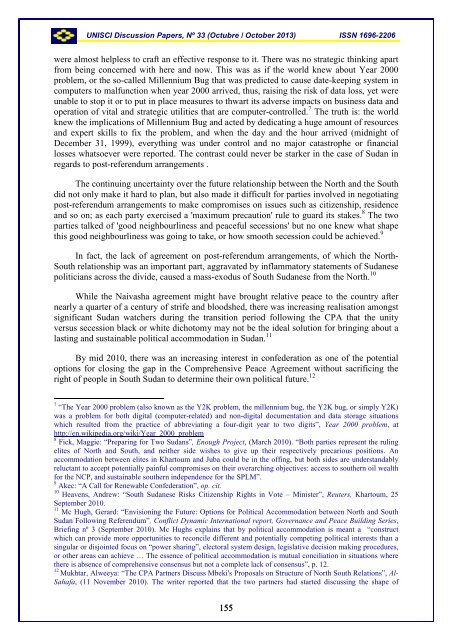UNISCI - Universidad Complutense de Madrid
UNISCI - Universidad Complutense de Madrid
UNISCI - Universidad Complutense de Madrid
Create successful ePaper yourself
Turn your PDF publications into a flip-book with our unique Google optimized e-Paper software.
<strong>UNISCI</strong> Discussion Papers, Nº 33 (Octubre / October 2013) ISSN 1696-2206were almost helpless to craft an effective response to it. There was no strategic thinking apartfrom being concerned with here and now. This was as if the world knew about Year 2000problem, or the so-called Millennium Bug that was predicted to cause date-keeping system incomputers to malfunction when year 2000 arrived, thus, raising the risk of data loss, yet wereunable to stop it or to put in place measures to thwart its adverse impacts on business data andoperation of vital and strategic utilities that are computer-controlled. 7 The truth is: the worldknew the implications of Millennium Bug and acted by <strong>de</strong>dicating a huge amount of resourcesand expert skills to fix the problem, and when the day and the hour arrived (midnight ofDecember 31, 1999), everything was un<strong>de</strong>r control and no major catastrophe or financiallosses whatsoever were reported. The contrast could never be starker in the case of Sudan inregards to post-referendum arrangements .The continuing uncertainty over the future relationship between the North and the Southdid not only make it hard to plan, but also ma<strong>de</strong> it difficult for parties involved in negotiatingpost-referendum arrangements to make compromises on issues such as citizenship, resi<strong>de</strong>nceand so on; as each party exercised a 'maximum precaution' rule to guard its stakes. 8 The twoparties talked of 'good neighbourliness and peaceful secessions' but no one knew what shapethis good neighbourliness was going to take, or how smooth secession could be achieved. 9In fact, the lack of agreement on post-referendum arrangements, of which the North-South relationship was an important part, aggravated by inflammatory statements of Sudanesepoliticians across the divi<strong>de</strong>, caused a mass-exodus of South Sudanese from the North. 10While the Naivasha agreement might have brought relative peace to the country afternearly a quarter of a century of strife and bloodshed, there was increasing realisation amongstsignificant Sudan watchers during the transition period following the CPA that the unityversus secession black or white dichotomy may not be the i<strong>de</strong>al solution for bringing about alasting and sustainable political accommodation in Sudan. 11By mid 2010, there was an increasing interest in confe<strong>de</strong>ration as one of the potentialoptions for closing the gap in the Comprehensive Peace Agreement without sacrificing theright of people in South Sudan to <strong>de</strong>termine their own political future. 127 “The Year 2000 problem (also known as the Y2K problem, the millennium bug, the Y2K bug, or simply Y2K)was a problem for both digital (computer-related) and non-digital documentation and data storage situationswhich resulted from the practice of abbreviating a four-digit year to two digits”, Year 2000 problem, athttp://en.wikipedia.org/wiki/Year_2000_problem8 Fick, Maggie: “Preparing for Two Sudans”, Enough Project, (March 2010). “Both parties represent the rulingelites of North and South, and neither si<strong>de</strong> wishes to give up their respectively precarious positions. Anaccommodation between elites in Khartoum and Juba could be in the offing, but both si<strong>de</strong>s are un<strong>de</strong>rstandablyreluctant to accept potentially painful compromises on their overarching objectives: access to southern oil wealthfor the NCP, and sustainable southern in<strong>de</strong>pen<strong>de</strong>nce for the SPLM”.9 Akec: “A Call for Renewable Confe<strong>de</strong>ration”, op. cit.10 Heavens, Andrew: “South Sudanese Risks Citizenship Rights in Vote – Minister”, Reuters, Khartoum, 25September 2010.11 Mc Hugh, Gerard: “Envisioning the Future: Options for Political Accommodation between North and SouthSudan Following Referendum”, Conflict Dynamic International report, Governance and Peace Building Series,Briefing nº 3 (September 2010). Mc Hughs explains that by political accommodation is meant a “constructwhich can provi<strong>de</strong> more opportunities to reconcile different and potentially competing political interests than asingular or disjointed focus on “power sharing”, electoral system <strong>de</strong>sign, legislative <strong>de</strong>cision making procedures,or other areas can achieve … The essence of political accommodation is mutual conciliation in situations wherethere is absence of comprehensive consensus but not a complete lack of consensus”, p. 12.12Mukhtar, Alweeya: “The CPA Partners Discuss Mbeki's Proposals on Structure of North South Relations”, Al-Sahafa, (11 November 2010). The writer reported that the two partners had started discussing the shape of155
















